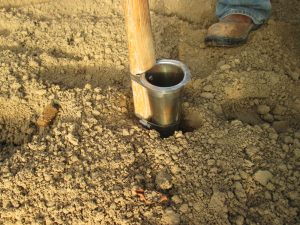This article introduces a new soil test for high tunnel growers.
Why is there a need for a new soil test for high tunnel production?
Soil tests are valuable tools helping growers decide how much fertilizers and/or other soil amendments to apply for growing a specific vegetable crop. It also helps growers to detect soil fertility-related problems early. The routine soil test and its recommendations for vegetable crops were developed based on research conducted in the open field. When it comes to high tunnel production, the routine soil test and recommendations become less valuable for at least three reasons:
- Crops growing in high tunnels typically have a much higher yield potential; they require more nutrients than the same crop grown in the open-field with lower yield potential. Therefore the soil test index (low, medium, high) and recommendation for specific nutrients may not apply for high tunnel crops.
- Since there is no rain to wash excess salts, salt built-up in high tunnel soils is a potential challenge for high tunnel vegetable production. Without specific notification, routine soil test does not test soluble salts thus it fails to alarm growers of the potential salinity problem.
- Using high alkanility groundwater as the only irrigation source has led to increased soil pH in many high tunnels. This is the opposite of field crop production in the Midwest where low soil pH is more of a problem. A routine soil test provides recommendations for lime application but it does not provide recommendations for how to reduce soil pH.
High tunnel soil test package from the University of Maine soil test lab.
Good news for high tunnel vegetable growers is that soil test designed specifically for high tunnel vegetable production is available at the University of Maine soil test lab. Depending on the length in production of the high tunnel, the lab provides a Basic High Tunnel Package and a Long-term High Tunnel Package. The basic high tunnel package includes routine soil test (the same soil test used for field crop production) plus soluble salts and nitrate and ammonium nitrogen test. The long-term high tunnel package includes basic high tunnel test plus a saturated media extract test for all major and micronutrients. Documented production practices and soil and leaf samples from 20 tomato high tunnels in the northeastern of U.S. were summarized and analyzed and became the basis of developing fertilizer recommendations for the high tunnel soil test. Please refer to the lab’s website at https://umaine.edu/soiltestinglab/ for more information about the high tunnel soil test including how to submit samples, price, and example reports.
What is the saturated media extract test?
Saturated media extract test (SME) is a test commonly used for greenhouse bench crop production or in irrigated desert. You will also find the SME method was used in testing organic transplant growing media in our next article. Not like in the routine soil test that the soil is first dried and mixed with an extractant; in the saturated media extract test, the soil is saturated with water. Although nutrient levels are both reported in the unit of ppm, it has totally different meanings. In the routine soil test, the nutrient is converted in dry soil, while the SME test expresses nutrients on an extract basis as mg/L (ppm). The routine soil test measures available nutrients held in soil reserve, while the SME test monitors the pool of immediately available nutrients. Under the situation that the soils in high tunnels have a high organic matter, and are intensively fertigated, the soil may perform just like a soilless media, thus the SME test is more applicable to test the soil. Many soil test labs provide the SME test, and some of the labs may call it the greenhouse mix test.
